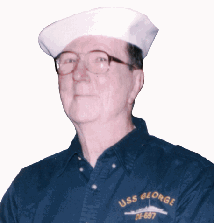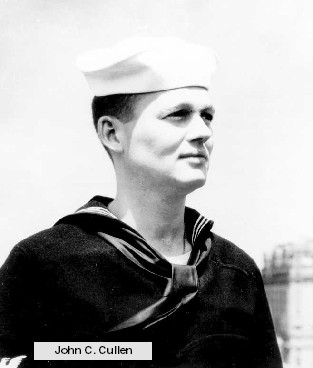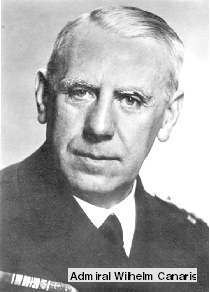|
|
|
|
|
|
|
|
|
|
|
|
|
|
|
|
|
|
|
|
|
|
|
|
|
|
|
|
|
|
|
|
|
|
|
|
|
The People News, a free newspaper serving Cleveland Tennessee (TN) and Bradley County Tennessee (Tn).
Of Bradley County Tn.
FEBRUARY 2010
The People News, a free newspaper serving Cleveland and Bradley County Tn.
|
|
|
|
|
|
|
HOME
|
|
BACK ISSUE ARCHIVE
|
|
EDITORIALS
|
|
LETTERS
|
|
CONTACT US
|
|
|
|
|
|
|
|
|
|
|
|
|
|
|
|
Bizarre, Fascinating, and Wacky World War I & ll Secrets.
|
|
|
|
|
|
|
|
|
by Cecil Owen
"Halt, who goes there?" "Red" Cullen shouted as the shadowy figure appeared out of the mist. Now, Red Cullen was Seaman Second Class of the US Coast Guard. He was from the US Coast Guard Station located at East Amagansett, Long Island, New York.
The time was midnight of June 13, 1942. John C. Cullen was on his night patrol along the normally deserted beach. He was alone and armed only with a large bright flashlight. Red was supposed to patrol down the sea shore for three long miles and then return. He always hated to walk alone in the thick darkness, with no light from the moon. The fog was drifting in, to chill the lonesome sailor.
Two of the men were wearing bathing shorts, which seemed a little odd for midnight. The third man was dressed in a nice civilian suit, which also seemed kind of strange, especially as they were trying to pull a small row boat onto the beach. "Who are you and what are you doing here," Red asked. "Are you in any kind of trouble?" The man in the suit stepped forward. "Who are you, alone out here at this hour," he replied. Red kept his flashlight in his pocket, so he reached for it now. "I am a sailor in the US Coast Guard," Red said. "Well, we are fishermen from Southampton, and our boat ran aground." That seems almost logical, Red thought at the moment. "Why don't you all come up to the Coast Guard station, and wait for daylight?" The man looked at him real hard, his eyes narrowed. It was dead quiet on the dark deserted beach. "Wait a minute," he said. "You don't know what's going on here. How old are you and do you have a father and mother? I don't want to have to kill you!!"
The torrent of questions was stopped by the arrival of a fourth man. He was also wearing only a bathing suit and he was dragging a big bag behind him. As he spoke to the man in civilian clothes, Red believed the language was German. "What is in that bag," he asked. "That bag is just full of clams, that's all." The man in civilian clothes joined in. "Yes, sir, that is right, just full of clams." Now Red Cullen realized that he was in grave danger. The man in civilian clothes looked at him sharply. He held out his hand. "Why don't you forget about this whole thing? Here is some money, how about a hundred dollars? Not enough? Then take three hundred dollars." To refuse would be to raise suspicion. There were four of them, and Red was unarmed. And they had already talked of the possible need to kill him.
|
|
|
|
|
|
|
|
|

|
|
|
|
|
|
|
|
|
|
|
|
|
|
Red shined his flashlight on the man's face as he stepped closer. "Sailor, now look me right in the eyes…. would you recognize me if you saw me again?" "Certainly not," Red exclaimed, as he slowly turned away. The man seemed satisfied, so he was not stopped.
Red Cullen ran all the way back to his Coast Guard station. Inside, Boatswain Mate Second Class Ross Jenette was in charge, and he quickly armed Red and six other sailors present. He gave them .30 caliber rifles, and led them toward the beach. It was still pitch dark, so they found absolutely nothing. He had just returned when Chief Boatswain Mate Warren Barnes arrived and took charge. He promptly led the men right back to the beach. There he saw a long dark object, a submarine, lying offshore. But it soon disappeared, and the sea was then calm and empty.
Just five miles from the Amagansett Coast Guard station, the 13th Mobile Infantry Unit of the US Army Coastal Defense Command was stationed. One army lieutenant and twenty soldiers were sent up to join the eight nervous coast guardsmen. Then morning came. They began to search the beach where Red Cullen had met the strangers. First a pack of cigarettes was found, half buried in the sand. The printing on the wrapper was in German. Next, they found a pair of wet bathing suits.
|
|
|
|

|
|
|
|
|
Also, a heavy object had made a deep furrow, being dragged in the sand. The furrow was traced until it stopped. Soon four large wooden crates were unearthed, two heavy and two light. The two heavy crates were bound with rope, with rope handles. Inside were metal water proof cases, containing high explosives with fuses. Enough to last an estimated two years. The other two contained civilian clothing forged identification cards, and nearly $100,000.00 in US currency.
Three days later on June 17, a submarine, the U-584, surfaced off the coast of Florida. Four other German spies were landed on the lonely beach. Just south of Ponte Vedra, Florida. They were rowed ashore by a sub crew member in an inflatable rubber raft. Like the Long Island Germans, the Florida Germans wore bathing suits, and carried four wooden crates ashore. Inside were the same items, civilian clothing, forged ID cards, around $100,000.00 in US currency and also enough explosives to last 2 years. This whole operation was totally unobserved by any Americans.
About 200 feet east of highway A1A, the Germans buried the boxes near an abandoned house. Then they walked down to Jacksonville Beach, and jumped into the surf. They acted like young men on vacation, and no one noticed anything unusual about them. Later, civilian clothes were donned, and they caught a bus into Jacksonville. They aroused no suspicion with the bus driver or any of the passengers. Arriving in Jackson, two men registered at the Seminole hotel, and two at the Mayflower hotel. As they spoke perfect English, no one was the least suspicious of them. They stayed one night, to review their plan. The next day, two headed for New York and two headed for Chicago. This was according to the plan laid out back in Germany. The Germans simply disappeared as the "Abwehr" had told them to do.
|
|
|
|
|
|
|

|
|
"Abwehr" was the German name for the secret service branch of the "Kriegsmarine" German Navy. It was headed by Admiral Wilhelm Canaris, and divided into three sections: espionage, sabotage, and counter espionage. Hitler and his staff depended on the Abwehr for world wide intelligence reports. The logo for the Abwehr was rather unusual: three brass monkeys, hear no evil, speak no evil, and see no evil. The eight German agents were all recruited and trained by admiral Canaris. Several had lived in the US since the early thirties. When war broke out, they were called back to Germany. One even left his American wife penniless and pregnant. But a couple just wanted to get out of Germany. They were trained very very well, even learned how to take a glass bottle, plain water, and dry green peas… and under pressure make a powerful bomb.
They were to become Hitler's first terrorists, with very diverse targets. All big Jewish departments stores, especially Macy's and Kimball's, the hydroelectric plants of Niagara Falls, the Aluminum Company of America with big plants in Arizona, Illinois, Tennessee, and New York, all big bridges and all big railroad depots were also selected targets. The Abwehr didn't realize how big the US was. If eighty terrorists instead of eight had been sent, it still would not have been enough.
|
|
|
|
|
|
|
|
One of the German agents in New York was George Johann Dasch. He was born in Germany in 1903, but had lived in the US for many years. He was also married to an American citizen, and fond of the country. He was very uneasy about their mission, and decided to become a "Spitzel," (stool pigeon). He would give himself up and turn state's evidence before something serious happened. However, no one would believe him, they thought he was just a crack pot.
The FBI offices in New York and Washington D.C. would not listen to him. He even telephoned J. Edgar Hoover, the FBI Chief, and was turned away. But he kept at it, and after nearly a week, an FBI agent finally listened to his story. Up in New York, the FBI, the Navy, and the Army were all exchanging barbs, and getting nowhere, when suddenly the case was solved for them by George Dasch's confession. By June 27, the last of the other seven German spy agents was located and arrested. So, in just 14 days, the German terrorist threat was eliminated.
The Abwehr plan was simple enough to have succeeded. It only failed because one German agent respected America and a young sailor who saw the agents on the beach. Six of the German spies were found guilty of espionage, and executed. Ernest Peter Burger, and another agent, also turned state's evidence, and was given a prison sentence. George Johann Dasch was given a light prison sentence. This was the end of German Admiral Wilhelm Canaris' plan to terrorize America by sabotage.
Sources:
U-Boats Offshore by Edwin P. Hoyt
WWII 4139 Strange and Fascinating Facts by Don McCombs and Fred L. Worth
Webster's New World German Dictionary
TV: The History Channel
.
|
|
|
|
|
|
|
HOME
|
|
BACK ISSUE ARCHIVE
|
|
EDITORIALS
|
|
LETTERS
|
|
CONTACT US
|
|
|
|
|
|
|
|
|
|
|

|
|





